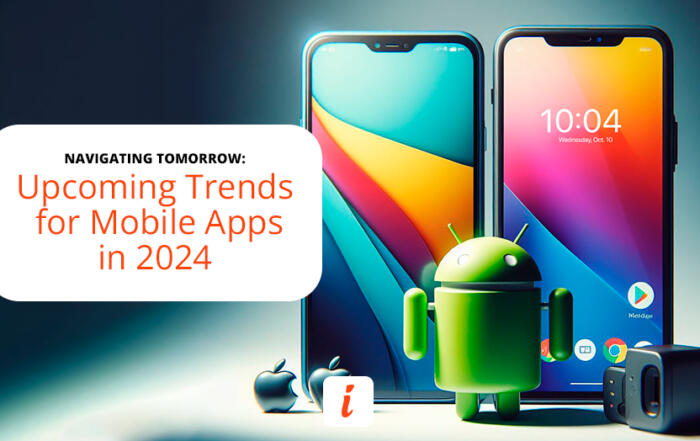MOBILE APP DEVELOPMENT: How to Make Your App a Market Winner
| By Inspire Visual Updated March 2025 |
It’s not too late to get into the app market, even though it may seem so with over 5.7 million apps available on the Google Play store and Apple App Store combined. With that many apps available, you would think every combination and feature would already be accounted for – but in reality, the demand for apps is only continuing to grow.
New apps are introduced every day despite competitors already having a presence in the app stores. What makes or breaks an app is the groundwork before launching the app and the continued maintenance after having published an app.
If you do your homework and follow our recommendations below, you will have a leg up on your competition and a good chance of getting your app in the spotlight.
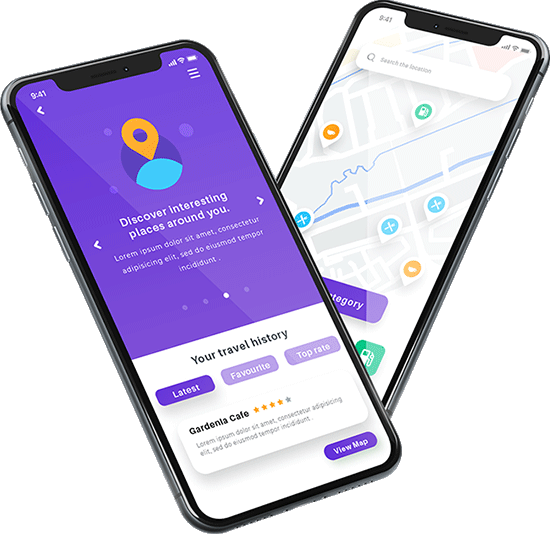
Come up with an original app idea
Coming up with an original idea for your app is easier said than done, we know.
Of course, you can release an app with a similar feature set to an already existing app. If you have a better UI/UX, a large marketing budget and good marketing plan your app can be successful, but an original idea for something users may need that they don’t have yet will make you stand out from the get-go.
Look at your competitors
An original idea does not have to encompass the entire app and you do not have to re-invent the wheel, but think of what is on the market now. What are your competitors offering and is there anything missing from those apps – a feature or offering that will make life easier or help people save money?
Robinhood
Take stock-trading app Robinhood for example, launched in 2015 by two former roommates, used for trading stocks and funds. Established firms like E-Trade, TD Ameritrade and Charles Schwab were already on the market with large user-bases offering exactly these tools.
What the established firms did not have though was commission-free trades. That differentiator was a major reason for the huge success Robinhood has since received and what helped it grow into the 300+ employee, $11 billion dollar company it is today.
Often the best ideas come from you needing something yourself which hasn’t yet been invented. Unfortunately, you can’t sit around and wait for that to happen. So, find your niche, download and use competitor’s apps and think about what brand new time or money saving feature, or educational purpose you can offer, and you will be on your way.
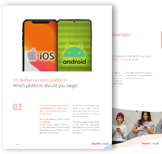
Finding your niche
When it comes to finding your niche, you should consider both what interests you and what you have expertise in. You should also research if there is a market for your niche.
For example, maybe your hobby is to collect pre-1970’s stickers and you would like an app for people to trade and buy/sell them. You can finance your app by ads or small commissions on each transaction.
The challenge is if the share of people with a similar hobby is too narrow, you probably won’t get the revenue you were hoping for. In that case, you might want to look for a more popular topic.
The most popular app store categories
The most popular category on both the Google Play store and Apple’s App Store is by far gaming. In the first quarter of 2020, gaming accounted for 10.35 billion downloads on Android and 2.97 billion on iOS. That is the largest number of game downloads on record.
Apps that can solve tasks (tools), photo and video apps as well as entertainment apps are also in high demand.
While there are no legal alternative app stores for iOS, there are some really cool alternative app stores for Android. Don’t forget to check them out as well, as they are likely to have another user base and category popularity than the big two.
Popularity makes competition more difficult
Do note that the more popular a category you choose, the fiercer the competition is going to be. So, you have to balance market popularity with competition strength.
In the “Keep Maintaining and Track Your Success” section coming up later, we’ll talk about market research tools. They are great for tracking your app’s success once it has been launched, but they can also provide helpful information when you initially research app categories.
Most popular Android and iOS app store categories by downloads
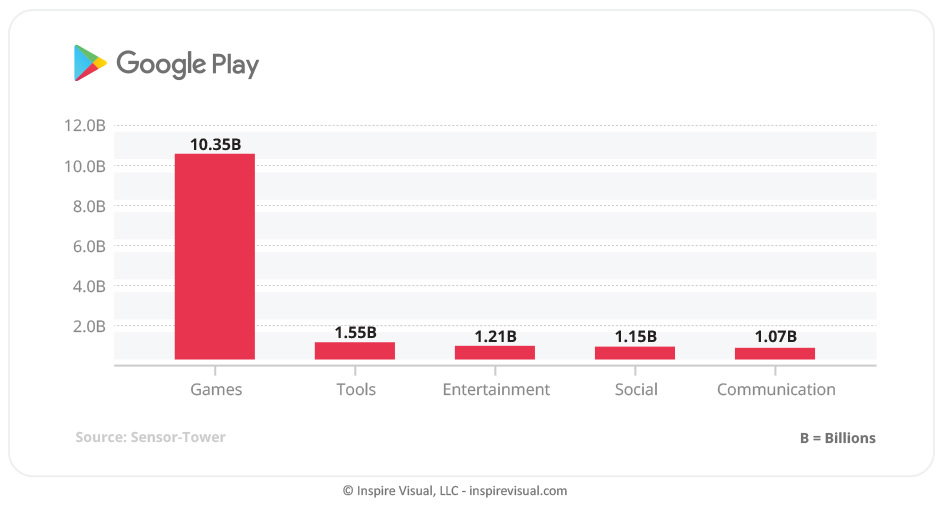
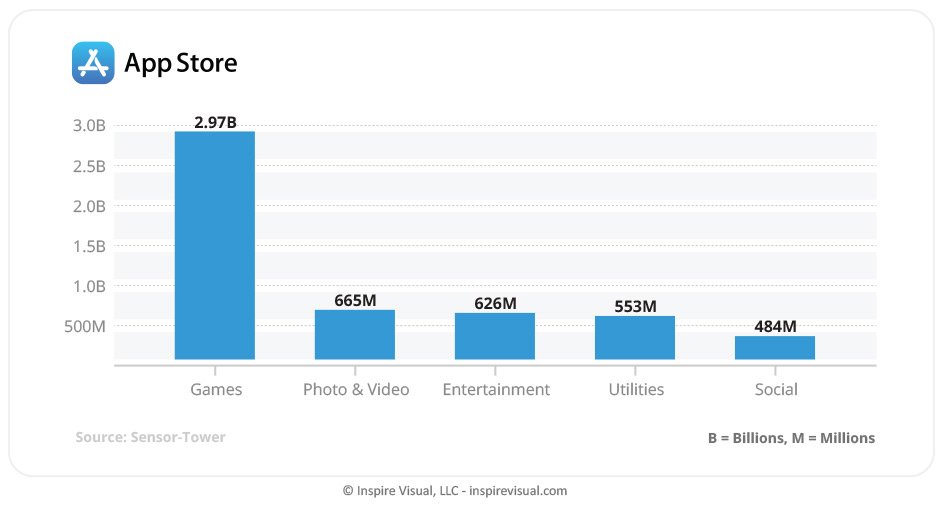

Use a modern UI and UX
If the latest design guidelines from Google and Apple dictates Flat Material design, you shouldn’t be using bevels and shadows in your user interface (UI). Your app will look outdated and people will think it’s from another decade (or at least many years old).
Of course, even using a domestic agency still require you to do your homework. Look at their portfolio, read reviews, call and ask them questions and get a feel for their competence.
Perfect your UX
Similarly, if your user experience (UX) uses poorly designed navigation (e.g., not utilizing Gestures (swiping between screens) to ease tasks), users will turn to a competitor’s app that has a better user experience, is cleaner, more streamlined and so on.
These are extreme examples. There are many gradients of UI/UX experiences, ranging from terrible to great. What’s important is that you don’t fall into the wrong end of the range.
Also, don’t forget to make sure your app is developed according to the latest UI/UX guidelines from Google and Apple respectively.
Your app should entice the user
Think of your app as a piece of furniture in someone’s house. You want to make sure they enjoy using it (UX) and like the way it looks (UI). It also needs to shine when it’s compared to similar apps and on display in the Google Play Store/Apple App Store.
With every new Android and iOS release, you want to make sure to update your app, so it doesn’t look liked an aged dinosaur in the app store.
Don’t use old design principles. Modernize your UI/UX and keep updating it
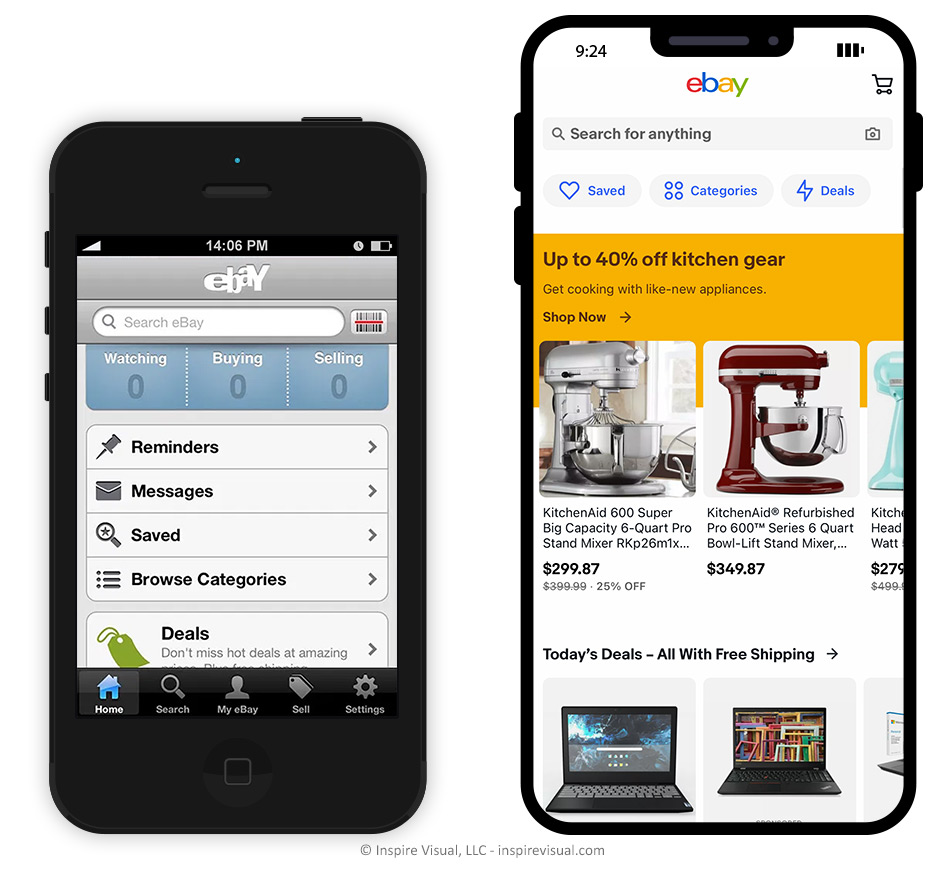
Select a payment model
If you are building an app, you are likely not doing without having some sort of incentive – not only to recoup your investment but preferably to make a nice profit.
It might surprise you that over 96% of Android apps can be downloaded without having to pay any up-front fees. Sounds too good to be true? It is.
Most completely free apps are making money through traditional sales of goods or services.
The rest of the seemingly-free apps are based on the following payment models:
- Subscription
- In-App Advertising
- Freemium
- Affiliate Marketing
- One-Time Paid App
Subscription based payment models are the most popular
Subscription based apps have gained massive traction the last few years and have become the preferred income model. The model works so well, because it doesn’t seem like a massive investment for users at first and they can usually cancel it anytime.
Of course, many are not likely to cancel that quick and will provide a stream of revenue month after month. It’s not an unusual practice to bank on people forgetting or postponing to cancel auto-pay indefinitely.
Traditional one-time paid apps have lost traction
The traditional one-time paid apps are still around, but they are few and far between these days. When the app stores just launched, these were actually the only payment model. One-time paid apps are, as the name says, a “pay for them one-time up-front and never have to worry about paying more” model.
Going into a detailed pros/cons about every payment model is too intricate for this article, but you can learn a lot more about this and more in our “How to Launch an App: The Definitive Guide” article. Worth noting is that choosing the right payment model depends on your app’s purpose. Some are right for limited life cycles and some are better for ongoing life cycles.
Optimization and download time
Since apps are on mobile phones, there’s a high chance they will be used while on the road. That means often with limited data-plans and slow download speeds.
Keep that in mind because it means your app should as small (file-size wise) and optimized as possible.
Every app is different
Developing an app is not a cookie-cutter process – there are a lot of ways to do it and many risks along the way. It’s important you know what you are doing or hire an app agency to do it for you.
First, you have to choose the right development kit for your app.
Cross-platform compatible apps
If you are targeting both Android and iOS, we recommend building your app in a cross-platform development kit. You can build one source code in these and target both platforms with less work than building two separate source codes.
The three leading cross-platform kits are Flutter (Google owned), React Native (Facebook owned) and Xamarin (Microsoft owned).
With any of these development kits you have the ground-work ready for producing an optimized apps with a small file-size.
Keeps your app’s file size small
When you create content for your app, also have in mind to work with small file-sizes if you import from an external source such as a server. Limit the amount of API calls as well and hide them in natural pauses in your app, such as well-designed transition screens.
Optimize the UX experience for user retention
Your app should also be optimized internally. That means no lagging animations, content that suddenly pops in after it has been loaded, etc. If your UX experience is slow or buggy looking people will quickly turn away from it.

Get featured on the Google Play and Apple’s App Store
If you want to be exposed to over 190 countries for free by being featured in Google Play and Apple’s App Store, you have to appeal to the Google Play team and/or Apple’s editors.
In the Google Play store, you can be featured in the “Editor’s Choice” section, in Apple’s App Store this section is called “Today”.
Advantages of being a featured app
There’s a big potential for aggressive growth once you make it to the Featured section. However, your app needs to top-tuned before pressing that ever so important ‘submission’ button for Google and Apple to review it.
Here’s what you should provide:
- Modern UI/UX experience – Your app must have a smooth UI/UX that follows each developer’s guidelines. That means use the right fonts, icon styles, button placements, gestures, navigation location and graphical style. Be sure to conform to Google’s Material Design Guidelines and Apple’s Human Interface Guidelines. Of course, if you are only submitting to either Google or Apple, just study the guidelines for that particular vendor.
- Bug-free app – Make sure your app is bug free. Don’t expect it to be included if it crashes when you rotate from portrait to landscape, content isn’t loading, functionality doesn’t respond, etc.
- Cater to the device manufacturer – It is much more likely you will be featured if your app is made specifically for that device. Bonus points if you use functionality taking advantage of the device’s latest technologies. Google and Apple want to showcase their devices too, so if you can highlight their technologies, they’ll notice.
- Highlight unique features – Tell a good story about why your app is unique. Put a spotlight on all the benefits people will reap from using your app.
- Update your app regularly – Don’t let it sit stale in the app store. Make sure to add new features, work on getting great reviews and don’t be afraid to listen to your users and embed new features suggested in the reviews.
- Localize your app – If your app is available in several countries, be sure to localize it for each country. While it may show difficult to get your app featured in one country, it could be much easier in another due to lower competition for that market.
- Make your app accessible – It’s important that you don’t forget people with disabilities. Aim to make your app usable to as many people as possible. Apple and Google like apps which accommodate these four major disabilities: vision, hearing, physical/motor skills and learning and literacy.
- Optimize your App Store page – Being your storefront, it’s really important you showcase your best video(s)/screenshot(s) from your app. Work on a good description and optimize your keywords, so people will find you when they search for relevant topics.
- Submit the form – Don’t just fill out the *required fields with quick commentary. Think about what you are writing. A person will review your submission and you are trying to get them interested in your app.
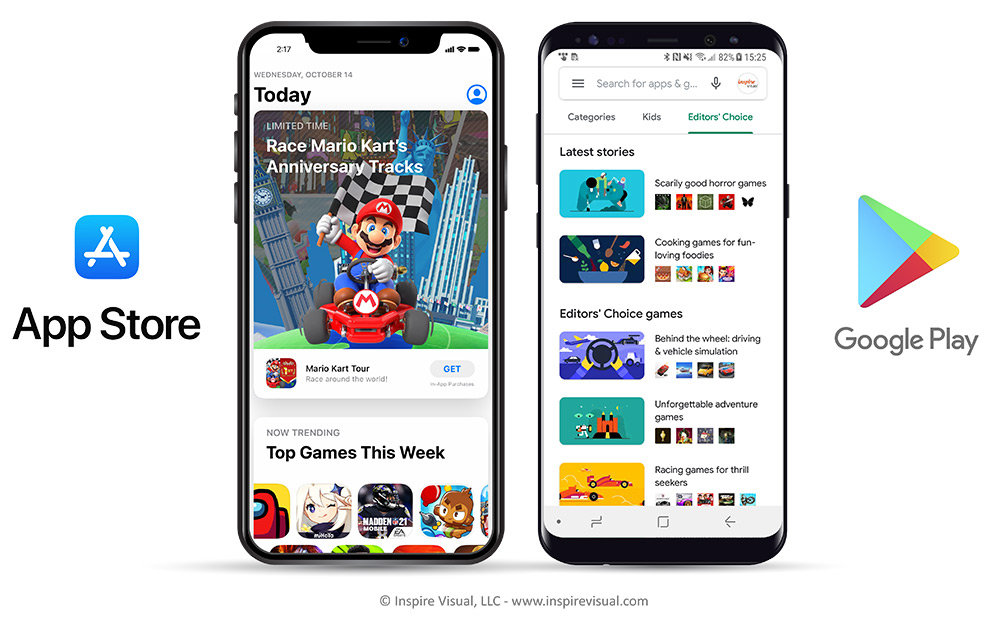
Keep maintaining and tracking your success
Once you have launched your app, you can’t just sit around and harvest the fruits of your labor. An app is like an organism that has to be continuously maintained to thrive.
Some tasks to keep in mind are:
- Analyze bug reports and update your app accordingly for a bug-free experience
- Stay informed about new operating system (OS) releases from Google and Apple and add the latest relevant functionality from every OS release.
- Keep marketing your app by sending out email campaigns and optimizing keywords based on market research for optimal store visibility.
- Spread the word on social media, for example having competitions, releasing news, etc.
- Monitor your competitors and implement new features to stay competitive
Be Aware of Yearly Mobile OS Releases
Keep an eye on new OS releases. Both Google and Apple usually release their new OS generation every year in the fall, but with beta versions for developers available in the summer. They often have old functionalities being phased out and new ones introduced.
It’s important to stay on top of it, so your app is not suddenly filled with bugs or left behind in the dust by not using the latest relevant feature(s).
Do Your Market Research Continuously
Also, stay on top of market research to optimize your marketing spend. There are some great market research tools out there with valuable in-depth information. They provide the most recent information on which markets has the largest growth, competitors marketing strategy and much more.
Check out SimilarWeb and Flurry, both offer free plans, and the more information-rich SensorTower and AppAnnie, both offer paid options.
Use the right strategy for user engagement
Getting a successful app is not just having an app that works flawlessly and gives the user a good experience.
The average mobile app retention is around 20% in the first 90 days, so you shouldn’t neglect current users. There are various ways to keep your users active and happy. To learn what to focus on you should read our article how to optimize your app’s user engagement.
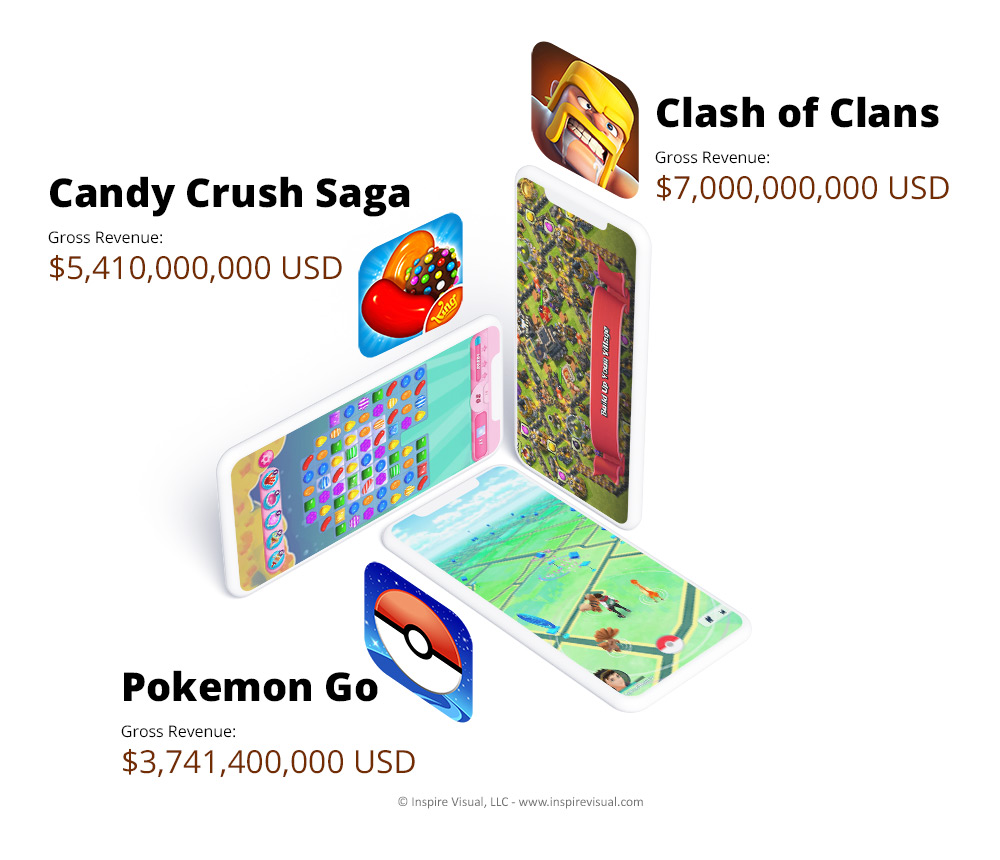

In conclusion
With mobile app downloads worldwide expected to increase to 147 billion by 2021 and 184 billion by 2024 there’s a large market just waiting for the next great app idea.
Believe in yourself
Why shouldn’t your idea be part of the mobile app revolution? Mobile apps are not going to go away anytime soon, so if you have the enthusiasm, a good idea and the willingness to work hard to realize your goal, there’s no excuse to sit around and let others run off with your dream.
We hope this article will help you get started. There’s a lot more to app development once you get the process rolling, but that’s something a good agency will do for you, so you don’t have to worry about anything but the fun parts like approving design, functionality and the finalization of your brand-new app.
If you need help building your new app, Inspire Visual can help you. We have extensive experience with creating quality, high-performing apps.
And, if you’d like to learn more about what it takes to build an app, give us a call or reach out with questions. We’d love to talk to you about your app idea!
About Inspire Visual
At Inspire Visual, we believe that compelling design, functionality and content help drive effective results. That’s why we work hard to provide innovative, visually inspiring and functionally sound solutions to address your marketing challenges and extend your brand’s reach.
We offer decades of experience helping brands worldwide with websites, mobile app development, email marketing, direct mail campaigns, brand identity design, UI/UX, graphic design, print design, tradeshow design and more. We feel privileged to be allowed into our clients’ businesses, and we strive to provide personal service and close collaboration throughout your project.
Call 407.434.9171 or email hello@inspirevisual.com to contact us, so we can meet you, learn more about your business and answer any questions you have. We’d love to connect with you!
YOU MAY ALSO LIKE
Revolutionizing User Experiences: AI-Powered Mobile Apps
Artificial Intelligence (AI) is impacting how we interact with technology on a daily basis. Find out which five AI apps are the most powerful today and how they can help improve your life.
Navigating Tomorrow: Upcoming Trends for Mobile Apps
In 2024, mobile apps are poised to undergo a transformative evolution with several key trends shaping the landscape. Get first-hand knowledge of what is to come and what to include in your app.
Are you ready to talk about your project?

Hello, I’m Angela, co-founder of Inspire Visual! Let’s have a chat about your project. Send an email or fill out the form to get started. Talk soon!


